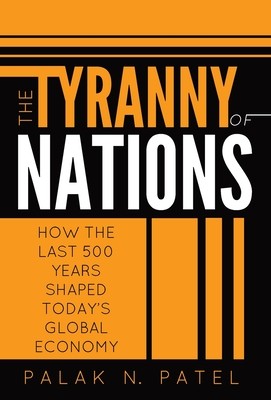
- We will send in 10–14 business days.
- Author: Palak Patel
- Publisher: Bifocal Media
- ISBN-10: 1736603930
- ISBN-13: 9781736603932
- Format: 14 x 21.6 x 2.1 cm, kieti viršeliai
- Language: English
- SAVE -10% with code: EXTRA
Reviews
Description
The Tyranny of Nations places the ground-shaking political and economic events of modern times in context. Palak Patel draws on his experience investing in government bond markets to demonstrate how the present fits a specific historical pattern that has defined the past 500 years. Modern-day trade liberalization and financial expansion all share distinct parallels with similar events in the 1600s and 1800s. Likewise, China's economic trajectory matches that of 19th-century Prussia and 17th-century France. And a certain British Prime Minister, foreshadowing Donald Trump's populism 150 years later, launched a similar attack on globalization after the financial crisis of 1866. In The Tyranny of Nations, there are no "isms"-no capitalism, socialism, or feudalism-but instead, only privileged interests vying for power. Challenging both the mainstream and its critics, Palak Patel shows how an endless cycle of cooperation and conflict between nations drives societal change. This unique perspective on the intersection of macroeconomics, history, and politics offers the reader a compass for navigating the future.
EXTRA 10 % discount with code: EXTRA
The promotion ends in 23d.03:16:46
The discount code is valid when purchasing from 10 €. Discounts do not stack.
- Author: Palak Patel
- Publisher: Bifocal Media
- ISBN-10: 1736603930
- ISBN-13: 9781736603932
- Format: 14 x 21.6 x 2.1 cm, kieti viršeliai
- Language: English English
The Tyranny of Nations places the ground-shaking political and economic events of modern times in context. Palak Patel draws on his experience investing in government bond markets to demonstrate how the present fits a specific historical pattern that has defined the past 500 years. Modern-day trade liberalization and financial expansion all share distinct parallels with similar events in the 1600s and 1800s. Likewise, China's economic trajectory matches that of 19th-century Prussia and 17th-century France. And a certain British Prime Minister, foreshadowing Donald Trump's populism 150 years later, launched a similar attack on globalization after the financial crisis of 1866. In The Tyranny of Nations, there are no "isms"-no capitalism, socialism, or feudalism-but instead, only privileged interests vying for power. Challenging both the mainstream and its critics, Palak Patel shows how an endless cycle of cooperation and conflict between nations drives societal change. This unique perspective on the intersection of macroeconomics, history, and politics offers the reader a compass for navigating the future.


Reviews